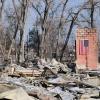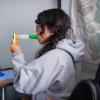Nicholas Goda
 Fairies and dragons and love! Oh my! An expert on romance fiction digs into one of the publishing industry's hottest trends.
Fairies and dragons and love! Oh my! An expert on romance fiction digs into one of the publishing industry's hottest trends. As the clock ticks down for TikTok, Casey Fiesler, a technology ethicist at CU Boulder, says that U.S. lawmakers are focusing on the harms of social media and not the benefits.
As the clock ticks down for TikTok, Casey Fiesler, a technology ethicist at CU Boulder, says that U.S. lawmakers are focusing on the harms of social media and not the benefits. Nathan Schneider, who studies how social media platforms are governed, says it’s time for users themselves to take back some power.
Nathan Schneider, who studies how social media platforms are governed, says it’s time for users themselves to take back some power. Three years after the freak Dec. 30 blaze destroyed more than 1,000 homes in Boulder County, two new studies offer insight into what happens to air quality and health in the aftermath of urban wildfires.
Three years after the freak Dec. 30 blaze destroyed more than 1,000 homes in Boulder County, two new studies offer insight into what happens to air quality and health in the aftermath of urban wildfires. Scientists at CU Boulder are using a mobile laboratory to collect 1,200 breath samples from cannabis users. The collaboration with the National Institutes of Technology could help lead to a reliable cannabis breathalyzer.
Scientists at CU Boulder are using a mobile laboratory to collect 1,200 breath samples from cannabis users. The collaboration with the National Institutes of Technology could help lead to a reliable cannabis breathalyzer. CU Boulder graduate student Dezell Turner has borrowed inspiration from his favorite sci-fi films to design an augmented reality tool that could one day help aerospace companies plan their routes from Earth to the moon.
CU Boulder graduate student Dezell Turner has borrowed inspiration from his favorite sci-fi films to design an augmented reality tool that could one day help aerospace companies plan their routes from Earth to the moon. Psychologist Angela Bryan, like many other avid runners, is no stranger to what many call the “runner’s high.” The scientist breaks down what happens in the body to make you feel so good during a long jog.
Psychologist Angela Bryan, like many other avid runners, is no stranger to what many call the “runner’s high.” The scientist breaks down what happens in the body to make you feel so good during a long jog. CU Boulder researchers have developed a new sound-based, handheld device that can swiftly and accurately detect signs of disease in a pin-prick of blood. Their findings are published in the journal Science Advances.
CU Boulder researchers have developed a new sound-based, handheld device that can swiftly and accurately detect signs of disease in a pin-prick of blood. Their findings are published in the journal Science Advances. As birth rates fall in the U.S. and beyond, a growing ‘pronatalist’ movement contends that people should be having more babies to prevent economic and cultural decline. Leslie Root, a social demographer who studies fertility trends, offers her take.
As birth rates fall in the U.S. and beyond, a growing ‘pronatalist’ movement contends that people should be having more babies to prevent economic and cultural decline. Leslie Root, a social demographer who studies fertility trends, offers her take. In the 24 hours after a python swallows its massive prey, its heart grows bigger and stronger and its metabolism speeds up fortyfold. Scientists want to know their secret.
In the 24 hours after a python swallows its massive prey, its heart grows bigger and stronger and its metabolism speeds up fortyfold. Scientists want to know their secret.


